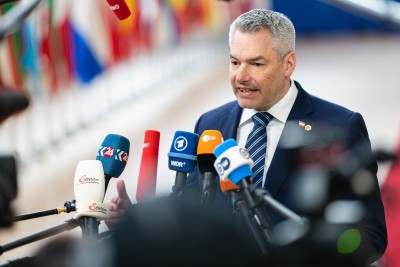The backstory with Herbert Kickl, the FPÖ leader, is based on his claim to be given the government formation mandate after the FPÖ’s electoral success in the 2024 National Council elections. Despite the FPÖ’s election victory, Federal President Alexander Van der Bellen decided to award the contract to form a government to ÖVP leader Karl Nehammer. Kickl sharply criticized this decision and declared that the FPÖ was still the legitimate governing party and promised that “the last word has not yet been spoken”. He sees the election result as a clear mandate from voters for political change.
Nehammer is aiming for a three-party coalition to ensure a stable majority in the National Council, as the ÖVP and SPÖ alone only have one mandate overhang. In addition to the SPÖ, the NEOS or the Greens could also be considered as a third partner. Talks are to be intensified in the coming weeks, with the focus on content to be determined during the fall vacations.
Challenges and differences
Despite the desire for a broad coalition, there are considerable political differences between the ÖVP and SPÖ. While Nehammer focuses on economic policy issues, migration, and integration as well as the health and care system, SPÖ leader Andreas Babler focuses on social justice and strengthening the welfare state. Negotiations are likely to be particularly difficult in the areas of labor market and social policy, as the SPÖ is calling for greater taxation of wealth, which the ÖVP is opposed to.
A key issue in the talks is also likely to be migration policy, where the ÖVP is pursuing a restrictive line, while the SPÖ is aiming for a more humane refugee policy. Both parties must find compromises to develop a common line that takes into account both the economic and social interests of the country.
Criticism and role of the FPÖ
The decision to appoint Nehammer and not Kickl to form the government has caused displeasure within the FPÖ. Kickl emphasized in a statement that the last word had not yet been spoken and that the FPÖ was still prepared to take on responsibility. He sees the FPÖ’s election success as a clear expression of the will of the voters and sharply criticizes Van der Bellen, whom he accuses of deliberately excluding the FPÖ from forming a government.
Van der Bellen defended his decision by pointing to the need for compromise and emphasized that in a functioning democracy, all political actors must come together. This view was supported by parts of the population, particularly given the polarization of the political landscape in recent years.
Possibilities of a three-party coalition
As a two-party coalition between the ÖVP and SPÖ would only result in a narrow majority, a three-party coalition appears to be the preferred option. The NEOS have already shown themselves to be open to talks, even if they have substantive differences with both the ÖVP and the SPÖ. As a liberal force, the NEOS could play a mediating role, particularly when it comes to tax policy and socio-political issues.
The Greens are also available as a potential partner, although they last governed in a coalition with the ÖVP. This cooperation was characterized by tensions, particularly in the area of climate policy, which could make future negotiations more difficult. Nevertheless, as a third coalition partner, the Greens could play an important role in securing a broad majority and incorporating issues such as climate protection into the government plan.
Looking to the future
The next few weeks will be decisive in determining whether the ÖVP and SPÖ can overcome their differences and form a stable government together with a third partner. The negotiations will show whether the parties succeed in finding compromises on important political issues that do justice to both the economic interests of the ÖVP and the social concerns of the SPÖ.
Van der Bellen has already emphasized that at the end of the negotiations, there will be compromises that could form the basis for a long-term stable government. The challenges facing Austria, including economic recovery, migration policy, and social balance, require a strong coalition capable of taking action.
The coming weeks promise exciting developments in Austrian domestic politics as the parties prepare for intense negotiations to form a new government.
National Council Election 2024
